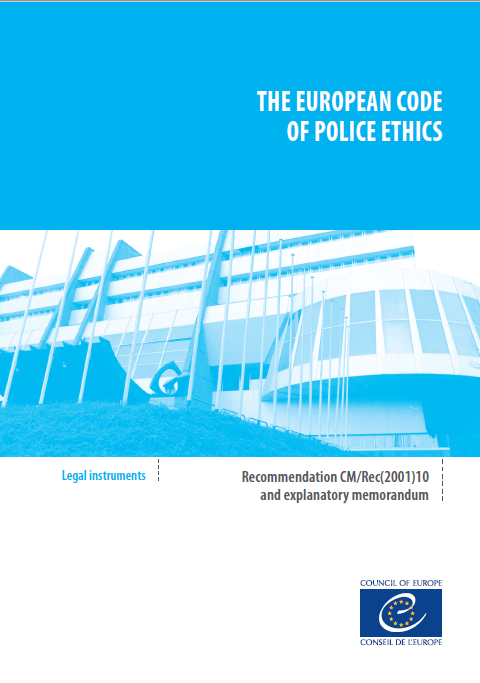Police Network
A closer cooperation between police services and the Council of Europe has been identified as a priority which is now addressed with the setting up of a Network of representatives of police services of the Council of Europe member States (Police Network).
The Police Network was created by a decision of the Committee of Ministers.
The mandate of the Police Network is to strengthen the institutional link between the Council of Europe police services of its member States, and to gather a better knowledge of the police services of the member States, their organisation, their mode of operation and their internal and external control bodies, and to share that knowledge among the Network members.

@ Shutterstock
The Police Network should also encourage the sharing of experience and exchange of views as regards the fight against the various forms of crime, facilitate the sharing of good practices and innovative techniques between police officers of the member States.
The Police Network should also support the implementation by member States of existing police standards and analyse the effects of police activity on the protection of human rights in member States.

Economic Crime and Cooperation Division
The Economic Crime and Cooperation Division (ECCD) is responsible for the Council of Europe’s cooperation and technical assistance related activities concerning measures against corruption, money laundering and terrorist financing. For two decades now, the ECCD has been supporting Council of Europe member states, EU member states, and non-member states and jurisdictions in the implementation of Council of Europe’s and other international anti-corruption and anti-money laundering standards.
The ECCD’s activities comprise a wide variety of interventions focusing on implementation of international standards addressing recommendations provided by monitoring bodies such as GRECO and MONEYVAL, often by involving practitioners from various jurisdictions in the ECCD’s activities, where they present on good practices from their countries and also train peers on various subjects

Saint-Denis Convention
The Council of Europe Convention on an integrated approach to safety, security and service at football matches and other sports events (CETS No. 218), also known as “Saint-Denis Convention” was opened for signature on 3 July and entered into force on 1 November 2017. As of 24 January 2023, this Convention has 25 States Parties and 36 Observers (29 States and 7 non-State organisations).
The Convention advocates a multi-agency integrated approach, based on three interdependent and overlapping pillars: Safety, Security and Service, to ensure a safe, secure and welcoming environment at football matches and other sports events, both inside and outside stadiums.
This Convention is the only binding international legal instrument that establishes institutional cooperation between all stakeholders involved in the organisation of football matches and other sports events.

Lanzarote Committee
The Council of Europe Convention on Protection of Children against Sexual Exploitation and Sexual Abuse, also known as “the Lanzarote Convention”, requires criminalisation of all kinds of sexual offences against children. It sets out that States in Europe and beyond shall, in particular, adopt specific legislation and take measures to prevent sexual violence, to protect child victims and to prosecute perpetrators.
The “Lanzarote Committee” (i.e. the Committee of the Parties to the Lanzarote Convention) is the body established to monitor whether Parties effectively implement the Lanzarote Convention and to identify good practices, in particular during capacity-building activities (study visits, conferences, etc.).

Execution of Judgments of the EctHR
The Department for the execution of judgments of the ECtHR, on the one hand, advises and assists the Committee of Ministers in its functions of supervision of the execution of judgments of the European Court of Human Rights, in accordance with Article 46, paragraph 2, of the Convention (with respect to final and binding judgments in which the Court found a breach of the Convention or friendly settlements therein); and on the other hand, the Department provides support to the member States in their efforts to achieve full, effective and prompt execution of the judgments of the European Court of Human Rights, in the cases to which they are parties.
Many judgments concern the work of the police, as mostly a law enforcement agency, but also police work as a public service offered by the state.

MEDICRIME Convention
The MEDICRIME Convention, open to Council of Europe member and non-member States, is the first and only legally binding criminal-law instrument aimed at combating the counterfeiting of medical products and other similar crimes that pose a threat to public health.
The Convention also provides the protection of victims. Given the undeniable transborder dimension of these crimes, the Convention and its Parties also engage in an enhanced effort to create multidisciplinary operational synergies among the different actors involved (justice, health and law-enforcement), through the promotion of co-operation at national and international level, in particular through a 24/7 Network.

GREVIO - Group of Experts on Action against Violence against Women and Domestic Violence
The Council of Europe Convention on preventing and combating violence against women and domestic violence, also knows as the Istanbul Convention, is the most far-reaching international treaty on women’s human rights. Preventing violence, protecting victims and prosecuting the perpetrators are the cornerstones of the convention.
In the area of law enforcement, states are required to ensure that agencies respond immediately to calls for assistance and manage dangerous situations adequately.
2025 Police Network Conference: Tackling Femicides and Violence Against Women requires Law Enforcement Action
For the third consecutive year, the Council of Europe Police Network met in Strasbourg. The 2025 conference titled "From Standards to Action: The Role of Law Enforcement in Preventing Femicides and Violence Against Women» brought together law enforcement officials and international experts to...
Call for candidates for a secondment in the field of Police
The Co-operation in Police and Deprivation of Liberty Division is looking for a candidate elligible for a secondment to the Council of Europe in Strasbourg (France). Job: Programme Manager in the field of Police Deadline for applying; 7 April 2025 For more information and for sending your...
Annual Conference of the Council of Europe Police Network
The Council of Europe Police Network hosted its annual conference on police data processing, data protection and human rights in Strasbourg from 19 to 21 March 2024. The conference gathered 65 participants, among which 30 represented member states of the Network. In addition, observers to the...
Conference of the Police Network on police databases and data protection
The Council of Europe’s Police Network hosted its annual conference on 19-21 March 2024 in Strasbourg (France). This event was dedicated to “Police data processing - How to harmonize police efficiency with data protection and Human Rights”. It brought together high-ranking representatives of...
Secretary General backs new police network on International Day of Police Cooperation
Secretary General Marija Pejčinović Burić has marked the international day of police cooperation on September 7th by giving her backing to the Council of Europe Network of Police Services. For more information: Link to the press release
Conference of the Police Network on the use of force in the context of police activities
The Council of Europe Police Network has held its annual international conference on police activities. This year’s event was dedicated to situations of violence and use of force. It brought together high-ranking representatives of the Ministries of Interior and national police services,...
1st constituent meeting of the Network of National Correspondents of Police Authorities
On Thursday 26 January 2023, the Directorate General of Human Rights and Rule of Law and its Cooperation in Police and deprivation of Liberty Unit organised online, via zoom software, the first constituent meeting of the Network of National Correspondents of Police Authorities, also known as the...
Council of Europe launched a new network of national law enforcement correspondents
The Council of Europe has launched a network of national police correspondents at a conference entitled "Policing in the digital age, how new technologies can help to better police our modern societies", held in Strasbourg on 28 and 29 June 2022. The event brought together senior representatives...




